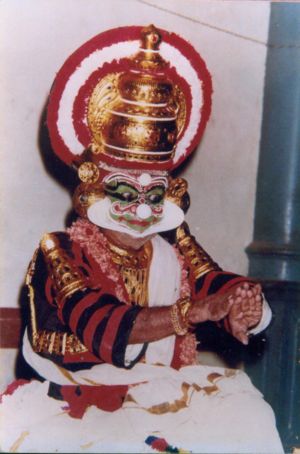- Bharata Muni
-
Bharata Muni
Bharatá Muni fue un antiguo musicólogo de la India, que escribió el libro Nāṭia śāstrá, un tratado teórico de dramaturgia y actuación, datado entre el 400 y el 200 a. C.
 Las enseñanzas del Nāṭia śāstrá se ven reflejadas en la tradición teatral Kutiyattam, que se realiza en Keralá (en el sur de la India) desde hace 2000 años. En la fotografía, Mani Madhava Chakiar actúa como el demonio Rāvana en la obra Abhiṣeka Naṭaka de Bhasa.[1]
Las enseñanzas del Nāṭia śāstrá se ven reflejadas en la tradición teatral Kutiyattam, que se realiza en Keralá (en el sur de la India) desde hace 2000 años. En la fotografía, Mani Madhava Chakiar actúa como el demonio Rāvana en la obra Abhiṣeka Naṭaka de Bhasa.[1]
En letra devánagari se escribe भरत मुनि.
Propone la teoría de tres tipos de actuación, la danza y la música clásica vocal e instrumental (que son parte integral del teatro sánscrito).
La forma clásica de danza llamada bharatá-nāṭyam está codificada en el nāṭya-śāstrá o bharatá-śāstrá.
Bharatá clasificó las formas teatrales sánscritas (natya\rupaka) en diez tipos. En Occidente se conoce sólo uno de esos tipos: el naṭaka.
Bharatá también delineó un grupo de rasas (‘sabores’) o emociones que serían influentes en la definición posterior de la danza, la música y el teatro hindú.
El Natyashastra tiene 36 capítulos y probablemente es la creación de varios autores y no de un solo erudito.
Notas
- ↑ Māni Mādhava Chākyār (1899-1990): Nātyakalpadrumam (pág. 6). Nueva Delhi: Sangeet Natak Akademi, 1996.
Categorías: Escritores de la India | Escritores en sánscrito | Músicos de la India | Musicólogos | Nacidos en el siglo II a. C. | Fallecidos en el siglo II a. C.
Wikimedia foundation. 2010.
